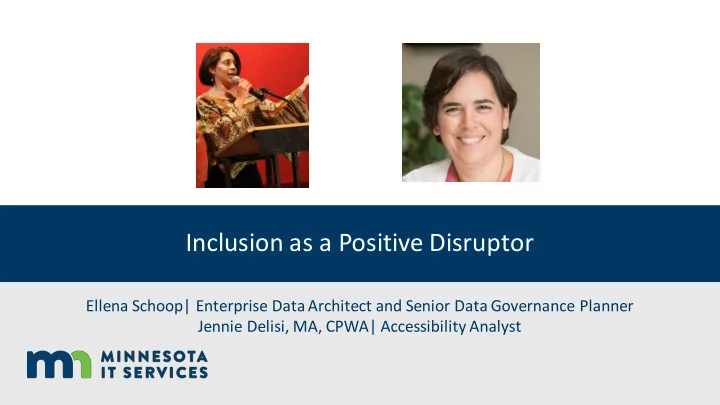

Inclusion as a Positive Disruptor Ellena Schoop| Enterprise Data Architect and Senior Data Governance Planner Jennie Delisi, MA, CPWA| Accessibility Analyst
Imagine…What if? You had a sudden major change: • Car accident making typing difficult? • Concussion causing memory issues and/or blurred vision? • Diabetes causing loss of vision? • Tremors due to a side effect of medication? • An infection that caused sudden hearing loss?
Now What? Would you want to keep your current job? • Send emails? • Read articles for work? • Use a telephone? Use a cell phone? • Use your work applications? Web pages? • Watch training videos and eLearning courses • Communicate with colleagues on social media?
Reality 1 In 4: Number of today’s 20-year-olds who will become disabled before they retire.
Minnesota By The Numbers Minnesota population: 5,577,487 % of Minnesotans reporting 1 or more disabilities (2016): • 5% - age 5-17 • 8.5% - age 18-64 • 31.7% - 65+ population.
Digital Accessibility = Access for All Foot Mouse Software that Magnifies and/or Changes Color Scheme on Computer Read Aloud in Outlook
AI Can Make the World More Accessible • Describing facial expressions • Automated alternative text and apps that identify what is in front of a cell phone camera: • Money • Text • Who is that?
Other AI Examples • Word prediction • IBM Content Clarifier • Autonomous Vehicles
Mobile as a Barrier Reducer • GPS: o Where is this person? o Help me find my way • Reduced device size, several devices in one • Mainstream = more users • Mainstream = lower cost
System Modernization as Accessibility Opportunity • Organizational change management – opportunities to train on accessibility best practices • Working with customer/vendor to understand accessibility requirements and standards • Reviewing work flow including accessibility of auto generated documents and notifications o Auto generated code, e.g., ARIA
Disrupt “Accessibility as an Afterthought” • Traditionally, test after product is completed • Ideally, accessibility is part of the design o Risk analysis o Project plan o Design o Test early o Test often
Accessibility Basics The four main guiding principles of accessibility in WCAG 2.0: • Perceivable • Operable • Understandable • Robust
Design through the Lens of Accessibility • Color • Audio and Video • Animation and Effect • Time • Structure • Readability
Data • Consider labels that will be used on form fields (on screen, and in form label) • Order of form fields is very important • Radio Button vs Checkbox matters • Poor data input design will cause poor data output
Workflow Workflow needs: • Alt text built into process: content creators writing good alt text • Designers considering color contrast and providing technical specs
Laying the Groundwork • Lay the groundwork for access to our systems, design of our systems, including accessibility • Architecture processes must efficiently adjust to the new culture of AI, system modernization, and mobile • Design through the lens of Accessibility
The Players Support Systems and Business The Expert End User Designer Service Desk Data Architect Leader Core Project Team Accessibility Team Executive Sponsor/Champion
Role of Office of Accessibility State of Minnesota Accessibility Work with: Standard • Executives and project teams • Digital accessibility for state building and purchasing IT employees and the public • Accessibility coordinators at agencies Outreach: • Subject matter experts at local, • Public webpage state, national and international • Newsletter levels • Basics of accessibility training
Thank You! Ellena Schoop ellena.schoop@state.mn.us Jennie Delisi jennie.delisi@state.mn.us
Recommend
More recommend